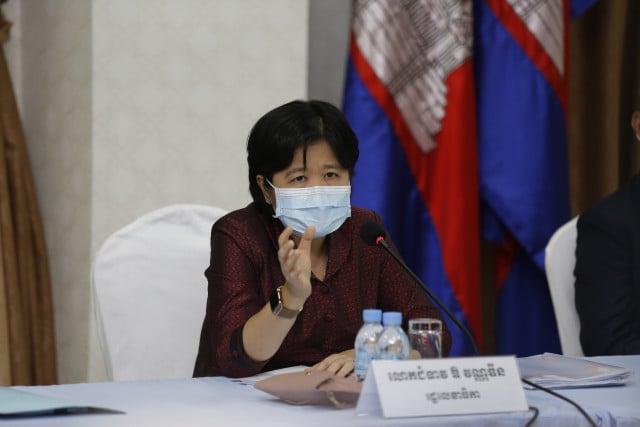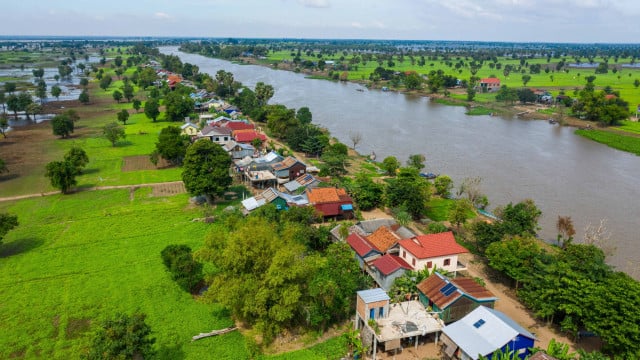A Hard Choice: Cambodians’ Race Between Khmer and Foreign Languages

- By Ky Soklim
- October 4, 2021 11:22 AM
Although it has endured multiple changes across the many eras of society as well as the external influences of the more widespread foreign languages, Khmer language still has its root deep inside the deepest part of Cambodian people’s heart. Between 1863 and 1953, during which Cambodia was a part of Indochina under French colonialism, French language inevitably got absorbed by Cambodian society.
The contemporary government of Cambodia still endures its influences until present day as many intellectuals prefer the French language in communication. Moreover, does this universally spoken English language have any effect on Cambodia’s past and present? Should the younger Cambodian generation be knowing Khmer or foreign languages such as French, Chinese or English in advance?
French, Chinese and English are the languages that can greatly provide and land Cambodian youths onto the employment market both domestically and internationally. On the other hand, Khmer, a mother-tongue language, is the official language of Cambodia and it is a must that all Cambodian citizens are able to write and speak it with proficiency. In view of their importance from all sides, it is almost compulsory that all young Cambodians should be taught both Khmer and one foreign language. However, it can be easier said than done. When one tends to know better a foreign language, one’s ability to thrive in Khmer language decreases and vice-versa.
What languages exert their influence on Khmer? In education, how hard is it for young Cambodians to choose which language to acquire first? Is choosing both at the same time a good idea?
For 90 years, Cambodia was colonized by France. A majority of intellectuals who lived during and after the colonial era used French almost as if it was an official language until the 1990s. As the new millennium became visible on the calendar, noticeably, the use of French language has seen a dramatic drop.
As the former began to show less influence, the latter jumped in abruptly. Through globalization, English has become increasingly common amongst Cambodians. This can be a contribution from the ASEAN community since this regional community uses English as an official way of communicating.
Four out of 10 countries in ASEAN, namely Singapore, the Philippines, Malaysia and Brunei, commonly use English for many aspects of their communication. Apart from the English schools, schools that teach Chinese, Korean, Thai, Vietnamese and Russian all try to get their fair share within the Cambodian market. As a reminder, during the 1980s, the Russian and Vietnamese languages were included by the government in the education system. About a decade later, French and English were offered for study by the government and other private educational institutions. During the early 1970s, French and English languages were also welcomed in some places before the Khmer Rouge came into power in 1975.
Counting from the last decade, with the inward flow of commercialization and investment, a lot of investors in Cambodia speak English or Chinese and, meanwhile, French language continues to receive less attention.
With a long political and cultural history in Cambodia, Cambodian people with an ancestral mixture of Chinese lineage still use Chinese language among their family members and learn the language at the abundant local Chinese schools. Economically, China is also further expanding its coverage on the global stage, Cambodia being no exception.
Almost 90 per cent of young Cambodian learners choose to study English or Chinese. Compared to the recent past, English and French were much more prioritized. As for now, a more popular duo is English and Chinese.
If that is not enough, some French speakers have to also add English into their language category if they prefer not to face any issues in terms of local or international communication. Speaking of the economy, politics and culture, the Khmer language is also hit hard by the pressure of other foreign languages. Regardless of the impact, this national language still retains its stance and firm position in Cambodian society.
For now, what is more important? Khmer or foreign?
The answer to this question simply cannot be short. Between 1990s and 2010s, those who can communicate in French, English or Chinese find it much easier to get employed in businesses, NGOs or even the government sector since institutions which worked with the government back then mainly conducted their operations in English as their tool. In terms of proportion, the few who could use foreign languages were bound with many work opportunities than those who could only speak Khmer.
This social trend encourages parents to send their children to foreign language schools, especially French or English, in the country and abroad by temporarily forgetting their own Khmer language. As a result, since they are nurtured in a westernized atmosphere, a new generation of people whose age is around 30 years old can achieve good capacity in using English. Meanwhile, they are also confronted with the obstacles of not proficiently using the Khmer language, especially in writing.
It is a pride that Cambodian youths can speak English well. However, on the exact contrary, Cambodian youths being unable to use the Khmer language properly can be a complicated reality and a shameful situation for Cambodian society. Many of them have to invest years in learning their own language pretty much again in order to obtain good writing skills using Khmer.
It is crucial to mention that, in the last 10 years, Cambodia’s economy is climbing up the scale at quite a noticeable rate. Locally-founded businesses are also on the rise. Due to these changes, the use of Khmer language in workplaces also increases in number. Without being too far away in the race from those who can use English or Chinese, workforces who can only use Khmer are gradually being spotted by more and more firms.
As the value of this national language rebounds, parents are confronted with an even harder decision: whether to send their children to a separate Khmer and foreign language school or schools, which can offer both at the same time. Seeing their successors speak both Khmer and foreign languages is what parents ultimately wish, yet the situation cannot be that smooth. Once the youngsters get enrolled in international schools, they will naturally feel more attached to foreign languages than Khmer and the opposite can also occur. Some parents complain about their kids wanting to study in foreign schools since they think that foreign languages become easier to study than Khmer.
In the face of such circumstance, some parents are joyful seeing their children pronouncing and writing English so fluently. Yet, it is still a burden for them to witness their own children struggle in Khmer language. With an obvious observation on the society, youngsters raised under financially-capable families perform better in English than Khmer. That is good. Regardless, this generation of youngsters will face a challenge harder than their previous generations since the national language is being vitalized stronger than ever before, from day to day, since the last 20 years. Paperwork in various sectors is conducted in Khmer language, which is different from one decade ago when foreign languages were prime.
There is another issue, which already worries Cambodian expats overseas. After escaping the Khmer Rouge regime to seek a more peaceful life in other nations, children who were born in Cambodia before or after the escape to France and the US generally understand Khmer language, yet formal and official usage of this language is still beyond their reach. Some Cambodian expats try to seek employment in their home country. However, as they have spent so much time abroad, blending into their motherland’s society and its language has become a challenge.
By combining the above-mentioned factors and the currently observable social trend, a proper understanding of Khmer language is a must-have skill. After that, a foreign language is also something that should not be neglected in terms of local and international employment especially in the field of international relations.















